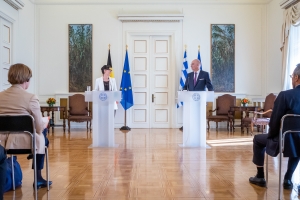Climate Responses for Sustaining Peace - Intervention of Ms. Hadja Lahbib - Sharm El Sheikh COP27
Excellencies,
Dear COP 27 participants,
Ladies and Gentlemen,
Sabah El Kheir,
Ana Farhan akoun èna.
I would like to thank and congratulate the Egyptian COP presidency on launching the “Climate Responses for Sustaining Peace” initiative. It is very timely and well chosen, all the more as it is launched here, on African soil and as it will focus on an African approach.
We all know by now how devastating climate change can be, and how extensive the impact on the livelihoods of people. We all have witnessed sudden events like tropical storms or floods in Pakistan, Nigeria or – to a lesser extent, in my own country: Belgium. We can observe it all around the world with the upset of seasons. In certain regions, exhausted resources caused by climate change can resuscitate dormant conflicts, resulting in people having to flee. Children, women and men being forced to leave their homes. It’s a vicious circle that has consequences for both continents, Africa and Europe. We cannot ignore the tragic plight of the displaced and the consequences it has in both their countries of origin and destination that have to deal with their arrival.
To help avert this, peacebuilding and conflict prevention have been at the centre of Belgium’s foreign policy and our diplomatic action. And indeed, to reach that goal, we need to address the effects of climate change. We support the holistic approach of the initiative launched today, in the spirit of the SDGs, of which respect for human dignity and human rights are an integral part. We all know the so called triple nexus: security, development and human rights. Fighting the effects of climate change is most efficient when everyone is involved, especially women and youngsters. In Africa, those two groups represent the vast majority of the population but are ill represented in decision making, although they are the ones most affected by climate change. I’m firmly convinced that women as well as young people have a role to play in mediating conflicts, and more importantly, in preventing them.
I participated in meetings of the Africa Europe Women Leaders Network, most recently in New York during the UN General Assembly. In this group, we endeavour to underline the interlinkages between gender equality and the environment. We have to integrate gender concerns and perspectives in all policies and programmes related to climate and environment.
Belgium is a staunch promotor of linking the debate about climate to that about security, as it is a clear example of how to bridge the gap between the silos of development, security and climate. We need to recognise in our work that climate change is a risk multiplier, especially for conflict in less resilient regions of the world.
Belgium is taking its responsibility: our country provided more than 700 million euro over the period 2013-2020 on climate finance alone. We focused on Africa’s least developed countries, and, more than others, we spent approximately 50% on adaptation, primarily in the form of grants. Within its climate action Belgium promotes sustainable agriculture with increased yields. It is a key way of preventing conflict. On a continent where farming remains by far the main occupation in rural areas and population is growing fast, an increased competition for land and water generates new conflicts.
Let me also say a word on financing for Loss and Damage. We hear the voices of many, in particular in Africa, calling for a substantial discussion on this topic and we now started engaging on this. Within its renewed cooperation programme with Mozambique, Belgium provides 2.5 million EUR to this end.
I am happy that these actions and this commitment align so beautifully with the initiative launched today. We are looking forward to support it, and to help prevent conflict and promote sustained peace on the African continent.


